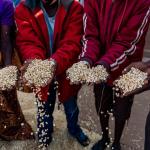
Food and fellowship go together like peas in a pod. Food can break the ice, especially if you are visiting a new church or speaking with a new church member. However, before we discuss the relationship between fellowship and food, let’s define food.
What Is Food
Food has many definitions. In broad terms, food is any nutritious substance organisms ingest to support growth, repair, and important bodily processes and provide energy.
Food also helps keep the body warm and helps the immune system prevent and fight diseases. Lastly, food can also support the brain and help it function correctly.
Food is so much more than a substance. It is a conversation starter that presents an opportunity to fellowship with your community.
What Is Fellowship
Fellowship means a community of people that share common interests, experiences or participate in activities. Sounds oddly familiar, right?
As a Christian community, we believe in the same thing. Within your community, you attend the same church as other church members. You participate in the same church activities as they do. After sharing a meal, you may learn that you share similar experiences as your church members, creating a stronger bond within your church community.
Think about the last religious event you attended that involved food. Did you sit in the corner eating food by yourself? Probably not.
You probably talked to a few of your friends. You may have even made a new friend. You probably laughed while eating or learned about an experience your friend is going through.
That’s the beautiful thing about food. It makes it easier to talk about your life. Plus, even if you have nothing to talk about, you can talk about how the food tastes.
Bible Verses About Fellowship And Food
Let’s get biblical just for a minute. Acts 2:26 says daily, persons who attended the temple broke bread in their homes. They happily received their food with glad hearts.
Breaking bread could mean one of 2 things. First, breaking bread could mean that they ate meals together. For example, growing up, it was common for my mom’s church members to stop by the house for a plate of food. They would either sit down and eat or take it to go.
They would talk and laugh about everything under the sun, including what happened in church or the latest life updates. Over time, their relationships became closer, and they became a part of our lives.
Second, breaking bread could refer to communion. After all, 1st Corinthians 11:24 says that Jesus broke the bread, which represented his body, and he instructed us to take communion in remembrance of Him.
This suggests that communion or eating the bread, which represents Christ’s body, is a form of worship. You not only take communion with your church members, but you also take it in front of them on the first Sunday of each month.
What better way to build a sacred bond with your church members than to celebrate the gospel of Jesus Christ and remember the greatest sacrifice of all time? There is nothing more that can build a stronger fellowship with your church.
Both communion and sharing a meal promote joy and togetherness. Furthermore, both activities can be seen as forms of worship that will ultimately bring us closer to God and closer as a community.
Acts 20: 7 states that Paul gathered with others on the first day of the week. He planned to leave the next day. But he ended up speaking until midnight the next day. This shows how food can start deep conversations.
How many times have you gone out to eat with a friend or someone you haven’t seen in a while and ended up talking for hours? It happened more than a handful of times, right? Food makes talking to others easier.

How Does Food Affect Fellowship
The relationship between fellowship and food is a positive one. For example, when Christians share a meal, they also share a spiritual connection.
In other words, a meal can act as the medium that welcomes people into the body of Christ. Here are 3 other ways food positively impacts fellowship.
Prepares You For The Hard Times
Life is not just about the good times. It’s also about the hard times. Sharing meals allows Christians to develop a close relationship that helps us take spiritual accountability for our actions.
Furthermore, food is also given as a gift during hard times. For instance, many people receive casseroles, sales, or partially prepared meals that they can throw in the oven from their church community when they lose a loved one. It is a sign that grieving persons are not alone.
The food can also act as a temporary escape. When you lose a loved one, you constantly think about them. You think about the memories you made with them, the good and bad times.
It’s easy to get overwhelmed with grief. For a few minutes, instead of drowning in grief, the person can focus on how good the food tastes, which can help put them in better spirits.
Increases Attendance
Sometimes getting people to attend church events is like trying to plant flowers in a garden full of weeds. Nothing seems to work no matter how hard you try.
The harsh reality is that people won’t come to your church events if you don’t provide some sort of incentive. Food is the perfect incentive.
While you can go the cheap route and serve tea, coffee, crackers, or another snack, attendance will not grow by much. You do not have to serve a full meal.
You can purchase or make foods that everyone loves, like pizza. You can also find out regular attendees’ favorite foods and make them. Either way, food will not only boost attendance, but you will find that people want to participate in activities like games and that strong friendships will develop among your church members.
Helps Persons Overcome Obstacles
If you prepare the food for church events, you will learn to overcome obstacles. A person can have allergies, celiac disease, or dietary restrictions like leading a vegan lifestyle. Therefore, developing a menu for your church events can be hard.
Nevertheless, you can easily find alternatives to traditional foods. For example, you can make Bolognese with mushrooms or make a cake with gluten-free flour. You can use this as an example to illustrate to a church member that overcoming the problem is always an option.
Promotes Story Telling
The biggest contribution food makes to fellowship is providing a safe space where members can share their stories. There is no better place than the dinner table for your church members to get something off their chest.
They can receive the love and support they need to get them through challenging times. But more importantly, they can receive spiritual guidance to help them navigate their earthly problems.
Fellowship and food are like salt and pepper. You just can’t have one without the other. Food can boost church attendance and help create a safe space. More importantly, it can help foster relationships between church members that last a lifetime.












